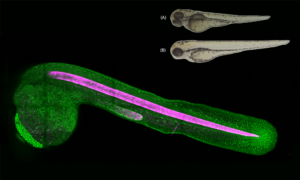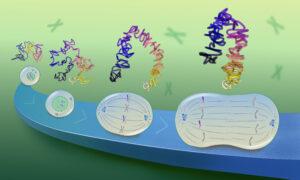
Model to predict prostate cancer progress
Cancer researchers have developed a computer model that can predict the course of disease for prostate cancer, based on cancer patient genomic and clinical data

The model is currently being implemented at a prostate cancer clinic in Germany. The researchers have also found the enzyme that appears to trigger some of the first mutations in prostate cancer. Cancer Cell publishes their results on 10 December 2018.
Prostate cancer is the most frequently diagnosed cancer in men in the Western world, with more than a million new cases each year. One of the key challenges is to differentiate between aggressive and non-aggressive disease. The new computer model has been designed to help solve this challenge. It was developed by an international team involving Jan Korbel and colleagues at EMBL, and researchers from the University of Copenhagen, Rigshospitalet, and the German Cancer Research Center (DKFZ).
Earliest mutational events
The researchers collected patient data from more than 200 early-onset patients: men diagnosed with prostate cancer before reaching the age of 55 years. These men had their entire cancer genome sequenced to characterise all mutations present in the tumour. Based on the data set, and by studying the earliest mutational events in prostate cancer, the researchers developed the computer model which can be used to predict how prostate cancer will develop for a given patient.
The computer model should become more widely available to German patients in approximately two to three years, and may be introduced at hospitals in other countries in future. The model also has the ability to learn from future data as it becomes available, and is thus expected to improve over time once in clinical use and applied to thousands of patients.
So far, it is not known precisely what initiates prostate cancer. However, by focusing on the earliest detected tumours, the researchers uncovered a mutational mechanism which involves an enzyme called APOBEC. This enzyme triggers some of the very first mutations in prostate cancer. “We believe that this enzyme mutates the prostate cells at a low but constant ‘clock-like’ rate,” says co-author Jan Korbel, group leader at EMBL. “Each time the cell divides, APOBEC is likely to cause mutations. If you have early-stage prostate cancer, you may have a couple of mutations caused by APOBEC. Twenty years later, you may have ten to twenty such mutations in cells of your prostate.”
New oncogene in prostate cancer
The team also found a possible new oncogene in prostate cancer – named ESRP1 – which is associated with highly aggressive prostate cancer with very fast-dividing cells. It is located close to an already known oncogene, and the researchers believe this is the reason it has not been discovered until now. In the future, ESRP1 could serve as a possible new biomarker to forecast whether a patient will develop aggressive prostate cancer.
- This news item is a shortened and edited version of the original press release issued by the University of Copenhagen
The study is the result of a large transnational collaboration between universities from different countries including Germany, Norway, Canada and Denmark, with principal funding by the International Cancer Genome Consortium (ICGC). Besides the UCPH, DKFZ, EMBL, Max Planck Institute for Molecular Genetics and Charité Universitätsmedizin, another major involvement came from Professor and co-author Thorsten Schlomm, who is leading the clinical implementation of the computer model at the clinic in Germany. The study is supported by ICGC funding kindly provided by the German Federal Ministry of Education and Research (BMBF), the Arvid Nilsson Foundation, Rigshospitalet’s Research Foundation, an ERC Starting Grant, the Sander Foundation, a grant from the Helmholtz International Graduate School at the German Cancer Research Center, the Norwegian Research Council and the American National Institutes of Health.


